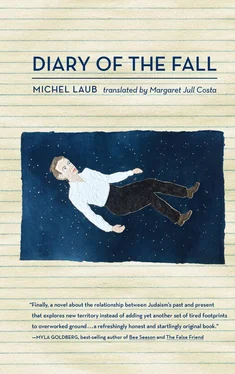9.
There are many ways of knowing how things actually happened. In this case, the story was told to my father by my grandmother. It is, besides, a banal enough story, and for me its sole interest lies in being able to compare it with my grandfather’s entry in his notebook: the house he describes is quite different, the owner of the house played records of music by Bach and Schubert and even made a joke about Schubert having died of typhoid fever, which did not strike my grandfather as in the least offensive — on the contrary, it was just a way of breaking the ice when, accompanied by my grandmother, he arrived as that evening’s special guest to whom the owner of the house offered a glass of wine, before inviting him to take his place at the table, telling a few more jokes and praising the readiness of Dutra’s party to reaffirm Brazil’s natural vocation for democracy .
10.
According to my grandfather, it was normal in Porto Alegre in 1945 for a rich, Germanophile father with a pretty single daughter, when confronted by a poor Jewish immigrant recently recovered from typhoid fever and owing two months’ rent at a guesthouse called Sesefredo, to ask that young man what his intentions were toward his daughter. It was normal for the young man to answer that he would like to resume his career as a teacher, but that, given his difficulties with the Portuguese language, which he would soon overcome, as well as certain expectations on the part of the owners of the Sesefredo Guesthouse, always expressed in a sympathetic, cordial manner , he was thinking of taking a temporary job as a traveling salesman offered to him by an agent, and which would require him to travel to sixteen towns a week selling sewing machines. There are various types of machine, the young man explains, with different uses and prices, and then the rich father of the pretty, single daughter smiles broadly and offers him another glass of wine and a cigar too, and at the end of that pleasant supper, they both toast to the fact that the young man will take the daughter of that proud, rich man to live in a one-bedroom apartment near to the Sesefredo Guesthouse, in a street where there are kennels and a poultry slaughterhouse, commercial establishments of unimpeachable reputation , in a building that survived a fire, but which is nonetheless solid and with a pleasant aspect to the sun , a place in which to start a new life to be commemorated in a ceremony a few months later, with a priest and a rabbi present to celebrate the union of the daughter of that proud, rich man and his poor, Jewish son-in-law, who will soon give him his one grandchild.
11.
When my father was born, it had been two years since my grandmother had spoken to my great-grandfather. She left home telling him that not only did she intend to stay with my grandfather, but that she also intended converting to Judaism. Conversion is not a simple process, because Judaism makes little effort to attract converts, and you have to submit to a long process of reading, living a Jewish life and talking to a rabbi, and on the day of her conversion the woman receives a Hebrew name and is immersed in a ritual bath of rainwater collected for that purpose, and I don’t know if my grandmother did this because of my grandfather, so that she could be closer to him, or if it was a reaction to her own family’s opposition to the marriage.
12.
My great-grandfather never forgave my grandmother. My great-grandmother stopped talking to her too. My grandmother had an older sister, who married a farmer in the interior of Rio Grande do Sul, and a younger brother who was studying to be a diplomat, and not one of them is alive today: my great-grandfather died from a heart attack, my great-grandmother in a car accident, my grandmother’s sister of tuberculosis, her brother from complications following appendicitis.
13.
Everyone on my grandfather’s side died in Auschwitz, and there isn’t a single line about them in the notebooks. There isn’t a line about the camp itself, how long my grandfather spent there, how he managed to survive or what he felt when he was freed, and I can imagine my father’s reaction when he read those notebooks six months or a year after my grandfather’s death and noticed these omissions.
14.
My grandfather wrote nothing about Judaism. He made no comment about my grandmother’s conversion. Nor any account of her attempts to understand the religion after she had converted, the books she read, her visits to the synagogue unaccompanied by him, the questions she asked and to which he gave only the briefest of answers. It’s possible that my father never heard him say anything on the subject when he was a child or indeed before the age of fourteen, some explanation of or potential clue to an identity that marked him out from the world around him, from his neighbors, his classmates, his teachers, from the radio announcers, characters in films, the people my father used to see from the window of the bus walking back and forth and who never gave the matter a second’s thought.
15.
My father began to take an interest in all this because of the death of my grandfather, which is perfectly understandable in the circumstances, because religion isn’t something you think about when you’re fourteen, even if that religion has the historical and cultural weight of Judaism, and even if my father had known that my grandfather’s refusal to deal with the subject was not a mere whim, a personal choice made by a grown man, but the symptom of something that was doubtless apparent in the way he lived his life and the way he treated his wife and son and everyone.
16.
Wife — person who takes charge of all the domestic tasks, ensuring that the most rigorous standards of hygiene are employed in the house and that during the day her husband remains undisturbed whenever he wishes to be alone .
17.
I don’t know when my grandfather began writing the notebooks, but it’s likely that it was decades after the events he describes, at a time when it became his main aim in life to remain shut up in his study drafting these encyclopedic entries. Because the text doesn’t change greatly as it progresses, as if it had been written in one go, and the pattern is set pretty much right from the start, with my grandfather talking about my grandmother and the sewing machine business that was so successful he was able to open a small shop in Porto Alegre shortly after my father was born.
18.
My father started working when he was fourteen, immediately after the death of my grandfather. Initially, my grandmother took over the running of the business, and I don’t know if she helped him get his bearings then or not, because at fourteen there isn’t much a boy can do in a shop apart from stocktaking or helping at the till or receiving orders or pretending that he’s older than he is so as to be able to write out receipts, but I think the hustle and bustle and the customers’ chatter and the visits to a tea shop two blocks away to eat cheesecake helped him get through those first few years and thus escape the grim prospect of having to come home from school and spend the evenings among furniture and objects that served only to remind him of my grandfather.
19.
In time, all this ceased to be pure therapy. My father came to enjoy the day-to-day life in the shop, and when he was eighteen or nineteen my grandmother left him in sole charge, and a few years later he opened another branch, then a second, then a third, and in each one he changed the merchandise. From sewing machines he moved on to fabrics, then to clothes, then to furniture and car parts, which meant that, by the time I was born, I was the heir to what had become a miniature empire.
Читать дальше












